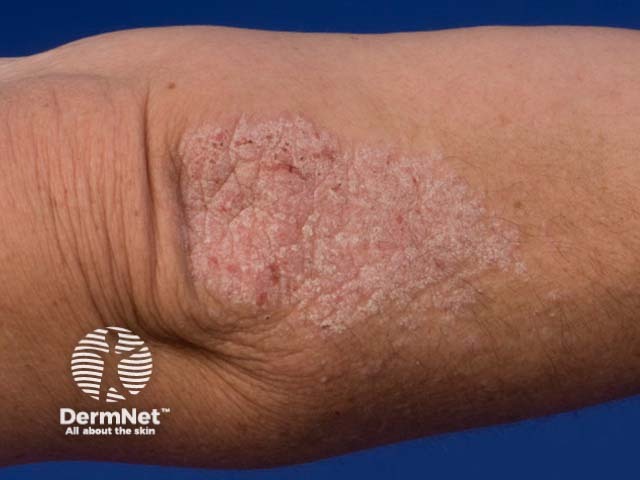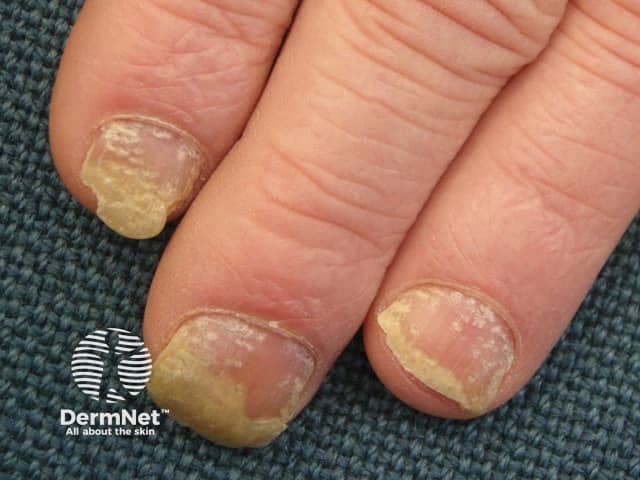Main menu
Common skin conditions

NEWS
Join DermNet PRO
Read more
Quick links
Psychological effects of psoriasis — extra information
Psychological effects of psoriasis
Author: Brian Wu, MD candidate, Keck School of Medicine, Los Angeles, USA. DermNet New Zealand Editor in Chief: Hon A/Prof Amanda Oakley, Dermatologist, Hamilton, New Zealand. Copy editor: Maria McGivern. March 2017.
Introduction - psoriasis
Demographics
Introduction - psychological effects of psoriasis
Clinical features
Diagnosis
Treatment
Outcome
What is psoriasis?
Psoriasis is a chronic skin disease characterised by red, scaly plaques. These can be minimal or very extensive on the scalp, face, trunk and limbs. Psoriasis may also involve the nails (psoriatic nail dystrophy). Psoriasis is relatively common, affecting around 2–4% of the general population. It is associated with psoriatic arthropathy and several other health problems.
Long-term, disfiguring scaling and redness on the face, neck and other readily visible portions of the body can cause severe negative psychological effects for people with psoriasis.

Chronic plaque psoriasis

Guttate psoriasis

Nail psoriasis
Who gets the psychological effects of psoriasis?
Most people with psoriasis report that it affects their quality of life to some extent. Patients with disfiguring scaling and redness on the face, neck and other readily visible portions of the body are particularly affected by the skin disorder, particularly if the onset of psoriasis is during childhood and adolescence.
It has been estimated that the psychological impact of their skin disorder is severe in 10–62% of patients with psoriasis.
What are the psychological effects of psoriasis?
Psoriasis is associated with a variety of psychosocial symptoms, including:
- Feelings of guilt, shame, embarrassment or helplessness
- Poor self-esteem and low self-worth, sometimes leading to social isolation
- Sexual dysfunction, due to self-consciousness or painful lesions
- Suicidal ideation, which occurs in up to 10% of patients with psoriasis
- Decreased vocational opportunities for people with psoriasis, due to discrimination or perceived restrictions on career choices, which can lead to employment and economic difficulties
- Interference with activities of daily living, including dressing, bathing and sleeping
- A negative impact on the patient’s family functioning, including financial hardship, caregiver burnout and degeneration of patient–family relationships
- Stress — which can trigger flares of psoriasis — in 43–68% of patients
- Depression, due to a decreased quality of life.
What are the clinical features of the psychological effects of psoriasis?
Depression affects a large percentage of people who suffer from psoriasis, and can lead to:
- Chronic fatigue
- Loss of interest in life and everyday activities
- Appetite changes
- Sleep disturbances
- Negative coping mechanisms, including the use of alcohol and/or drugs, self-harm or other high-risk behaviour.
How are the psychological effects of psoriasis diagnosed?
Useful tools that can be used to measure the impact of psoriasis on the individual include:
- The Psoriasis Area and Severity Index (PASI), which measures the physical extent and severity of the disease
- The Dermatological Life Quality Index (DLQI), used for psoriasis and other dermatological disorders to gauge their psychological and functional impact
- The Psoriasis Disability Index (PDI)
- The Family Psoriasis Index (PFI-14) questionnaire.
What is the treatment for the psychological effects of psoriasis?
Treatment for psoriasis may require collaboration between a dermatologist and a psychologist or psychiatrist to deal with both the physical and psychological effects of the disorder. The successful treatment of the physical symptoms of psoriasis often leads to improvement in the psychological effects of psoriasis on the patient; for example, their depression, alcohol dependence, or behavioural disorder (eg, obsessive–compulsive disorder) improves.
The psychological effects of psoriasis may be treated with any combination of the following:
- Psychological counselling
- Oral and topical psychotropic medications
- Relaxation/stress management therapy
- Cognitive behavioural therapy
- Hypnosis and/or guided imagery training
- Involvement in patient support groups.
What is the outcome for the psychological effects of psoriasis?
The psychological effects of psoriasis can have deep and negative impact on family and other social relationships, work and employment, education and other aspects of life for those affected, especially if those effects go untreated.
References
- De Oliveira M de FSP, Rocha B de O, Duarte GV. Psoriasis: classical and emerging co-morbidities. An Bras Dermatol 2015; 90: 9–20. DOI: 10.1590/abd1806-4841.20153038. PubMed Central
- Fletcher T; Psoriasis And Psoriatic Arthritis Alliance (PAPAA). The psychosocial burden of psoriasis. 17 June 2013. Available at: www.papaa.org/articles/psychosocial-burden-psoriasis (accessed 31 January 2017).
- Levenson J; Primary Psychiatry. Psychiatric issues in dermatology, part one: atopic dermatitis and psoriasis. 2008. ResearchGate (accessed 18 September 2024).
- Sathyanarayana Rao TS, Basavaraj KH, Das K. Psychosomatic paradigms in psoriasis: psoriasis, stress and mental health. Indian J Psychiatry 2013; 55: 313–15. DOI: 10.4103/0019-5545.120531. PubMed Central
On DermNet
- Psoriasis
- Treatment of psoriasis
- Psychosocial factors in dermatology
- Treatment of psychodermatological disorders
- The mind and the skin
- Drug-induced psoriasis
Other websites
- Dermatology Life Quality Index (DLQI)
- Psoriasis Area and Severity Index (PASI) Calculator and PASI Worksheet
- Psoriasis Disability Index (PDI)
- Psoriasis Family Index (PFI-14)
